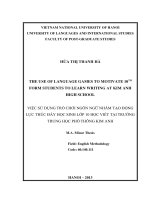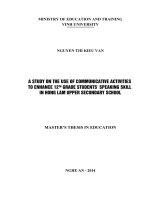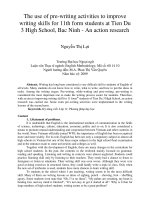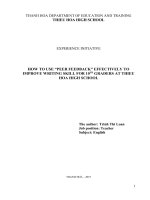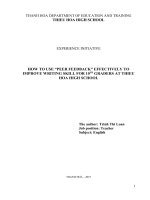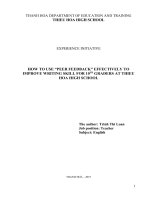Use synonyms to enhance writing
Bạn đang xem bản rút gọn của tài liệu. Xem và tải ngay bản đầy đủ của tài liệu tại đây (115.51 KB, 11 trang )
UNIVERSITY OF LANGUAGES AND INTERNATIONAL STUDIES
POST GRADUATE DEPARTMENT
--------- --------
Course title: Semantics
Use synonyms to enhance writing
Lecturer: Dr. Ha Cam Tam
Student: Do Thi Phuong Thanh - K18C
Ha Noi, 06 - 2010
1
Chapter 1: Introduction
1.1 Rationale
English writing is one of the four necessary skills for second language learners. It
plays an important role in studying as well as in teaching. There are many helpful way to
to enhance English writing skills. I would like to preface that whatever I share in
this article are ‘ways’ I have gone through that are prone to my improvement in English
writing skills. As a language teacher, I sometime meet an interesting question: "Can you
imagine how language would be if we always used the same words when speaking,
reading and writing? If everything (person, place, object…) in the world had only one
word to refer to it, the world would be a very boring place." It is important to know how
to distinguish the meaning of synonyms especially at advanced levels. This leads to the
rise and proves the importance role of synonymy in enhancing writing.
1.2. The aims of the study
The paper is expected to give variety definitions of “synonymy” and its related
terms offered by different authors, as well as its functions. This is followed by provident
of how synonyms used to make vivid writing.
1.3. The methods of the study
To achieve the aims, the study is based on the collection and selection of academic
literature. Several suggestions are used for using synonyms effectively in teaching
writing.
1.4. The designs of the study
This study has five chapters. Chapter 1 presents the reasons that lead to the choice of
the study. Chapter II shows the development of the study. Chapter III illustrates some
implications in teaching. Chapter IV summarizes what the study has achieved.
2
Chapter 2: Development
2.1. Definitions of synonymy
What is a synonym? It is a word very similar in meaning to another word that
may replace that word as an equivalent, or perhaps even add a trace of additional meaning
to what the writer intended to say.
Synonymy is defined in different books, lectures and other sources, whatever the
definition is, it has the same meaning as the following cited work.
The word synonym is a composite of two Greek words: The prefix “syn” means
“together” and “onym” is “name.” Synonyms- naming the same thing. In other words,
synonyms are words or phrases which share the exact same meaning or a very similar
meaning.
Lyons (1995, p. 61) defines two expressions as full synonymous if the following
conditions are met:
All their meanings are identical
They are synonyms in all contexts
They are semantic equivalent in all aspects of their meaning
Webster's new dictionary of synonyms discuss the concept at length (p. 5-31) and provide
the following definition:
“A synonym, in this dictionary, will always mean one of two or more words in the
English language which have the same or very nearly the same essential meaning...
Synonyms, therefore, are only such words as may be defined wholly, or almost wholly, in
the same terms. Usually they are distinguished from one another by an added implication
or connotation, or they may differ in their idiomatic use or in their application.”
(Merriam-Webster, 1984, p. 24).
Synonyms are different phonological words which have the same or very similar
meanings. It is the definition by John I. Saeed (2nd edition - 2003, p.65)
Synonyms are actually words of the same parts of speech which have similar
meaning, but not identical meanings. They may share a similar denotational or
connotational meanings. They can differ from each another in terms of denotation or
connotation. (Nguyen Hoa, 2004, p.72)
A synonym is a word that has the same or nearly the same meaning as another
word in the same language. For example, a synonym for "dark" is "dim." Words often
3
have many synonyms; for example, "drab" "ebony," and "murky" are all synonyms for
"dark."
From these definitions, we can easily distinguish synonyms in order to use it in
writing.
2.2. The use of synonymy in the writing process
2.2.1. The writing process
Writing process is both a key concept in the teaching of writing and an important
research concept in the field of composition studies.
Research on the writing process (sometime called the composing process) focuses
on how writers draft, revise, and edit texts. Composing process research was pioneered by
scholars such as Janet Emig in The Composing Processes of Twelfth Graders (1971),
Sondra Perl in “The Composing Processes of Unskilled College Writers (1979), and Linda
Flower and John R. Hayes in “A Cognitive Process Theory of Writing” (1981).
Generally the writing process is seen as consisting of five stages:
Prewriting:
Drafting:
Revising:
Editing:
Choosing and collecting to make a plan
first draft
Clear up “wanderings”
spelling, grammar, punctuation
Publishing:
Putting your writing out there for others to see, hear, read, enjoy.
These stages can be described at increasing levels of complexity for both younger
students and more advanced writers. The five stages, however, are seldom described as
fixed steps in a straightforward process. Rather, they tend to be viewed as overlapping
parts of a complex whole. Thus, for instance, a writer might find that, while editing a text,
she needs to go back to draft more prose, or to revise earlier parts of what she has written.
2.2.2. The use of synonymy in the writing process
You can make your writing a lot more vivid by finding lively synonyms for the
words in your sentences. For example, instead of saying, "His hair was dark," you can say
"His hair was inky." Which sentence sounds better and is more descriptive?
When replacing a word with its synonym, make sure the meaning of the sentence
in the specific context is maintained as well. Synonyms are defined according to certain
senses of words.
A Basic Example
4
A simple report reads,
“It was hot in the South-African plains. Elephants were standing in the water and
lions and other wild beasts weren’t chasing the other animals. The hyenas were laying
around.”
Employing the cinnamon-like synonyms, we might come up with:
“It was a sultry day on the veldt. Panting predators ignored victims, while
elephants lethargically bathed in muddy water. Hyenas—ordinarily restless— merely
lounged about.”
In addition to replacing words with synonyms for variety, try adding to the
meaning of what you are writing. Consider the following brief sample in order to avoid
rounding out:
“We climbed the mountain called The Priest one summer day last year. We
anticipated it would be a long climb for us, so we packed lunch. It took us nearly all that
day to make it to the top. When we got there, we rested, took photos, and then enjoyed
what we had packed for lunch.”
Improve it by rounding out with detail words, including synonyms:
“We hiked the mountain aptly named The Priest one August day last year. We
anticipated it as an endurance climb, so we packed lunch. It took the four of us from
7AM until late in the afternoon to reach the summit. When we got there, we rested, took
snapshots, then devoured fried chicken and potato salad.”
There is a list of common synonyms used in writing. These synonyms are
suggested for students in their writing. This list is in full context in the Appendix page.
Students can make their writing much more interesting and academic basing on the
following synonyms:
Amazing- incredible, unbelievable, improbable, fabulous, wonderful, fantastic, astonishing,
astounding, extraordinary
Anger- enrage, infuriate, arouse, nettle, exasperate, inflame, madden
Angry- mad, furious, enraged, excited, wrathful, indignant, exasperated, aroused, inflamed
Answer- reply, respond, retort, acknowledge
Ask- question, inquire of, seek information from, put a question to, demand, request, expect,
inquire, query, interrogate, examine, quiz
Awful- dreadful, terrible, abominable, bad, poor, unpleasant
5
Chapter 3: Implications and Conclusion
3.1 Implications
As the teacher, in writing classes, I myself pay much attention to the content of
which students write, whether it is relevant or not. On the basis of the study, the following
implications for EFL ans ESL teachers can be suggested. In order to help learners become
more effective writers, we need to make a crucial distinction between language accuracy
and writing skills. Learners should be familiar with the way writers use alternative
synonyms and synonymic references to add variety to their writing whilst painting a
picture of the people or places they are writing about. When producing their own writing,
learners may wish to 'build' synonym reference chains for people and places into their
planning to anticipate reader reaction. It is important to mention that the teachers'
evaluation of students' essays is another important factor in achieving synonyms in
writing. For example, the marking on content and word choices should be explicitly
stated. By doing this, students can refer to their teachers' evaluation easily and make
corrections accordingly.
3.2. Conclusion
Language and the way to use language should be used and taught naturally, every
body knows this. Then, it is time we supply our learners with popular but also very basic
knowledge on the ways how to write. Using synonyms is one of the best choices which
help your writing more convincing. It certainly helps learners in understanding vocabulary
and adapting it into their own writing. Writing needs to be concentrated--rich in choice
words and colorful phrases. Accomplish this purpose by using synonyms is the necessary
choice for a vivid writing.
6
Appendix
SYNONYMS FOR WORDS COMMONLY USED IN STUDENT'S WRITINGS
Amazing- incredible, unbelievable, improbable, fabulous, wonderful, fantastic, astonishing,
astounding, extraordinary
Anger- enrage, infuriate, arouse, nettle, exasperate, inflame, madden
Angry- mad, furious, enraged, excited, wrathful, indignant, exasperated, aroused, inflamed
Answer- reply, respond, retort, acknowledge
Ask- question, inquire of, seek information from, put a question to, demand, request, expect,
inquire, query, interrogate, examine, quiz
Awful- dreadful, terrible, abominable, bad, poor, unpleasant
Bad- evil, immoral, wicked, corrupt, sinful, depraved, rotten, contaminated, spoiled, tainted,
harmful, injurious, unfavorable, defective, inferior, imperfect, substandard, faulty, improper,
inappropriate, unsuitable, disagreeable, unpleasant, cross, nasty, unfriendly, irascible, horrible,
atrocious, outrageous, scandalous, infamous, wrong, noxious, sinister, putrid, snide, deplorable,
dismal, gross, heinous, nefarious, base, obnoxious, detestable, despicable, contemptible, foul,
rank, ghastly, execrable
Beautiful - pretty, lovely, handsome, attractive, gorgeous, dazzling, splendid, magnificent,
comely, fair, ravishing, graceful, elegant, fine, exquisite, aesthetic, pleasing, shapely, delicate,
stunning, glorious, heavenly, resplendent, radiant, glowing, blooming, sparkling
Begin - start, open, launch, initiate, commence, inaugurate, originate
Big - enormous, huge, immense, gigantic, vast, colossal, gargantuan, large, sizable, grand, great,
tall, substantial, mammoth, astronomical, ample, broad, expansive, spacious, stout, tremendous,
titanic, mountainous
Brave - courageous, fearless, dauntless, intrepid, plucky, daring, heroic, valorous, audacious, bold,
gallant, valiant, doughty, mettlesome
Break - fracture, rupture, shatter, smash, wreck, crash, demolish, atomize
Bright - shining, shiny, gleaming, brilliant, sparkling, shimmering, radiant, vivid, colorful,
lustrous, luminous, incandescent, intelligent, knowing, quick-witted, smart, intellectual
Calm - quiet, peaceful, still, tranquil, mild, serene, smooth, composed, collected, unruffled, levelheaded, unexcited, detached, aloof
Come - approach, advance, near, arrive, reach
Cool - chilly, cold, frosty, wintry, icy, frigid
Crooked - bent, twisted, curved, hooked, zigzag
Cry - shout, yell, yowl, scream, roar, bellow, weep, wail, sob, bawl
Cut - gash, slash, prick, nick, sever, slice, carve, cleave, slit, chop, crop, lop, reduce
Dangerous - perilous, hazardous, risky, uncertain, unsafe
Dark - shadowy, unlit, murky, gloomy, dim, dusky, shaded, sunless, black, dismal, sad
Decide - determine, settle, choose, resolve
Definite - certain, sure, positive, determined, clear, distinct, obvious
Delicious - savory, delectable, appetizing, luscious, scrumptious, palatable, delightful, enjoyable,
toothsome, exquisite
Describe - portray, characterize, picture, narrate, relate, recount, represent, report, record
7
Destroy - ruin, demolish, raze, waste, kill, slay, end, extinguish
Difference - disagreement, inequity, contrast, dissimilarity, incompatibility
Do - execute, enact, carry out, finish, conclude, effect, accomplish, achieve, attain
Dull - boring, tiring,, tiresome, uninteresting, slow, dumb, stupid, unimaginative, lifeless, dead,
insensible, tedious, wearisome, listless, expressionless, plain, monotonous, humdrum, dreary
Eager - keen, fervent, enthusiastic, involved, interested, alive to
End - stop, finish, terminate, conclude, close, halt, cessation, discontinuance
Enjoy - appreciate, delight in, be pleased, indulge in, luxuriate in, bask in, relish, devour, savor,
like
Explain - elaborate, clarify, define, interpret, justify, account for
Fair - just, impartial, unbiased, objective, unprejudiced, honest
Fall - drop, descend, plunge, topple, tumble
False - fake, fraudulent, counterfeit, spurious, untrue, unfounded, erroneous, deceptive,
groundless, fallacious
Famous - well-known, renowned, celebrated, famed, eminent, illustrious, distinguished, noted,
notorious
Fast - quick, rapid, speedy, fleet, hasty, snappy, mercurial, swiftly, rapidly, quickly, snappily,
speedily, lickety-split, posthaste, hastily, expeditiously, like a flash
Fat - stout, corpulent, fleshy, beefy, paunchy, plump, full, rotund, tubby, pudgy, chubby, chunky,
burly, bulky, elephantine
Fear - fright, dread, terror, alarm, dismay, anxiety, scare, awe, horror, panic, apprehension
Fly - soar, hover, flit, wing, flee, waft, glide, coast, skim, sail, cruise
Funny - humorous, amusing, droll, comic, comical, laughable, silly
Get - acquire, obtain, secure, procure, gain, fetch, find, score, accumulate, win, earn, rep, catch,
net, bag, derive, collect, gather, glean, pick up, accept, come by, regain, salvage
Go - recede, depart, fade, disappear, move, travel, proceed
Good - excellent, fine, superior, wonderful, marvelous, qualified, suited, suitable, apt, proper,
capable, generous, kindly, friendly, gracious, obliging, pleasant, agreeable, pleasurable,
satisfactory, well-behaved, obedient, honorable, reliable, trustworthy, safe, favorable, profitable,
advantageous, righteous, expedient, helpful, valid, genuine, ample, salubrious, estimable,
beneficial, splendid, great, noble, worthy, first-rate, top-notch, grand, sterling, superb, respectable,
edifying
Great - noteworthy, worthy, distinguished, remarkable, grand, considerable, powerful, much,
Gross - improper, rude, coarse, indecent, crude, vulgar, outrageous, extreme, grievous, shameful,
uncouth, obscene, low
Happy - pleased, contented, satisfied, delighted, elated, joyful, cheerful, ecstatic, jubilant, gay,
tickled, gratified, glad, blissful, overjoyed
Hate - despise, loathe, detest, abhor, disfavor, dislike, disapprove, abominate
Have - hold, possess, own, contain, acquire, gain, maintain, believe, bear, beget, occupy, absorb,
fill, enjoy
Help - aid, assist, support, encourage, back, wait on, attend, serve, relieve, succor, benefit,
befriend, abet
8
Hide - conceal, cover, mask, cloak, camouflage, screen, shroud, veil
Hurry - rush, run, speed, race, hasten, urge, accelerate, bustle
Hurt - damage, harm, injure, wound, distress, afflict, pain
Idea - thought, concept, conception, notion, understanding, opinion, plan, view, belief
Important - necessary, vital, critical, indispensable, valuable, essential, significant, primary,
principal, considerable, famous, distinguished, notable, well-known
Interesting - fascinating, engaging, sharp, keen, bright, intelligent, animated, spirited, attractive,
inviting, intriguing, provocative, though-provoking, challenging, inspiring, involving, moving,
titillating, tantalizing, exciting, entertaining, piquant, lively, racy, spicy, engrossing, absorbing,
consuming, gripping, arresting, enthralling, spellbinding, curious, captivating, enchanting,
bewitching, appealing
Keep - hold, retain, withhold, preserve, maintain, sustain, support
Kill - slay, execute, assassinate, murder, destroy, cancel, abolish
Lazy - indolent, slothful, idle, inactive, sluggish
Little - tiny, small, diminutive, shrimp, runt, miniature, puny, exiguous, dinky, cramped, limited,
itsy-bitsy, microscopic, slight, petite, minute
Look - gaze, see, glance, watch, survey, study, seek, search for, peek, peep, glimpse, stare,
contemplate, examine, gape, ogle, scrutinize, inspect, leer, behold, observe, view, witness,
perceive, spy, sight, discover, notice, recognize, peer, eye, gawk, peruse, explore
Love - like, admire, esteem, fancy, care for, cherish, adore, treasure, worship, appreciate, savor
Make - create, originate, invent, beget, form, construct, design, fabricate, manufacture, produce,
build, develop, do, effect, execute, compose, perform, accomplish, earn, gain, obtain, acquire, get
Mark - label, tag, price, ticket, impress, effect, trace, imprint, stamp, brand, sign, note, heed,
notice, designate
Mischievous - prankish, playful, naughty, roguish, waggish, impish, sportive
Move - plod, go, creep, crawl, inch, poke, drag, toddle, shuffle, trot, dawdle, walk, traipse, mosey,
jog, plug, trudge, slump, lumber, trail, lag, run, sprint, trip, bound, hotfoot, high-tail, streak, stride,
tear, breeze, whisk, rush, dash, dart, bolt, fling, scamper, scurry, skedaddle, scoot, scuttle,
scramble, race, chase, hasten, hurry, hump, gallop, lope, accelerate, stir, budge, travel, wander,
roam, journey, trek, ride, spin, slip, glide, slide, slither, coast, flow, sail, saunter, hobble, amble,
stagger, paddle, slouch, prance, straggle, meander, perambulate, waddle, wobble, pace, swagger,
promenade, lunge
Moody - temperamental, changeable, short-tempered, glum, morose, sullen, mopish, irritable,
testy, peevish, fretful, spiteful, sulky, touchy
Neat - clean, orderly, tidy, trim, dapper, natty, smart, elegant, well-organized, super, desirable,
spruce, shipshape, well-kept, shapely
New - fresh, unique, original, unusual, novel, modern, current, recent
Old - feeble, frail, ancient, weak, aged, used, worn, dilapidated, ragged, faded, broken-down,
former, old-fashioned, outmoded, passe, veteran, mature, venerable, primitive, traditional, archaic,
conventional, customary, stale, musty, obsolete, extinct
Part - portion, share, piece, allotment, section, fraction, fragment
Place - space, area, spot, plot, region, location, situation, position, residence, dwelling, set, site,
station, status, state
9
Plan - plot, scheme, design, draw, map, diagram, procedure, arrangement, intention, device,
contrivance, method, way, blueprint
Popular - well-liked, approved, accepted, favorite, celebrated, common, current
Predicament - quandary, dilemma, pickle, problem, plight, spot, scrape, jam
Put - place, set, attach, establish, assign, keep, save, set aside, effect, achieve, do, build
Quiet - silent, still, soundless, mute, tranquil, peaceful, calm, restful
Right - correct, accurate, factual, true, good, just, honest, upright, lawful, moral, proper, suitable,
apt, legal, fair
Run - race, speed, hurry, hasten, sprint, dash, rush, escape, elope, flee
Say/Tell - inform, notify, advise, relate, recount, narrate, explain, reveal, disclose, divulge,
declare, command, order, bid, enlighten, instruct, insist, teach, train, direct, issue, remark,
converse, speak, affirm, suppose, utter, negate, express, verbalize, voice, articulate, pronounce,
deliver, convey, impart, assert, state, allege, mutter, mumble, whisper, sigh, exclaim, yell, sing,
yelp, snarl, hiss, grunt, snort, roar, bellow, thunder, boom, scream, shriek, screech, squawk, whine,
philosophize, stammer, stutter, lisp, drawl, jabber, protest, announce, swear, vow, content, assure,
deny, dispute
Scared - afraid, frightened, alarmed, terrified, panicked, fearful, unnerved, insecure, timid, shy,
skittish, jumpy, disquieted, worried, vexed, troubled, disturbed, horrified, terrorized, shocked,
petrified, haunted, timorous, shrinking, tremulous, stupefied, paralyzed, stunned, apprehensive
Show - display, exhibit, present, note, point to, indicate, explain, reveal, prove, demonstrate,
expose
Slow - unhurried, gradual, leisurely, late, behind, tedious, slack
Stop - cease, halt, stay, pause, discontinue, conclude, end, finish, quit
Story - tale, myth, legend, fable, yarn, account, narrative, chronicle, epic, sage, anecdote, record,
memoir
Strange - odd, peculiar, unusual, unfamiliar, uncommon, queer, weird, outlandish, curious,
unique, exclusive, irregular
Take - hold, catch, seize, grasp, win, capture, acquire, pick, choose, select, prefer, remove, steal,
lift, rob, engage, bewitch, purchase, buy, retract, recall, assume, occupy, consume
Tell - disclose, reveal, show, expose, uncover, relate, narrate, inform, advise, explain, divulge,
declare, command, order, bid, recount, repeat
Think - judge, deem, assume, believe, consider, contemplate, reflect, mediate
Trouble - distress, anguish, anxiety, worry, wretchedness, pain, danger, peril, disaster, grief,
misfortune, difficulty, concern, pains, inconvenience, exertion, effort
True - accurate, right, proper, precise, exact, valid, genuine, real, actual, trusty, steady, loyal,
dependable, sincere, staunch
Ugly - hideous, frightful, frightening, shocking, horrible, unpleasant, monstrous, terrifying, gross,
grisly, ghastly, horrid, unsightly, plain, homely, evil, repulsive, repugnant, gruesome
Unhappy - miserable, uncomfortable, wretched, heart-broken, unfortunate, poor, downhearted,
sorrowful, depressed, dejected, melancholy, glum, gloomy, dismal, discouraged, sad
Use - employ, utilize, exhaust, spend, expend, consume, exercise
Wrong - incorrect, inaccurate, mistaken, erroneous, improper, unsuitable
10
References
1.
Janet Emig, The Composing Processes of Twelfth Graders, Urbana: NCTE, 1971.
2.
Sondra Perl, “The Composing Processes of Unskilled College Writers," Research in
the Teaching of English 13 (1979), pp. 317-36, ed. Victor Villanueva, Urbana
3.
Linda Flower and John R. Hayes, “A Cognitive Process Theory of
Writing,” CCC 32 (1981), pp. 365-87, ed. Victor Villanueva, Urbana: NCTE, 2003.
4.
Maxine Hairston, "The Winds of Change: Thomas Kuhn and the Revolution in the
Teaching of Writing," CCC 33 (1982), pp. 76-88, ed. Susan Miller, New York
5.
John I. Saeed, Semantics (2nd edition) (2003), p.65. Blackwell publishing
6.
Nguyễn Hoà, Understanding English semantics, (2004), Vietnam International
University Publishing House.
7.
/>
8.
/>
9.
/>
10.
/>
11

